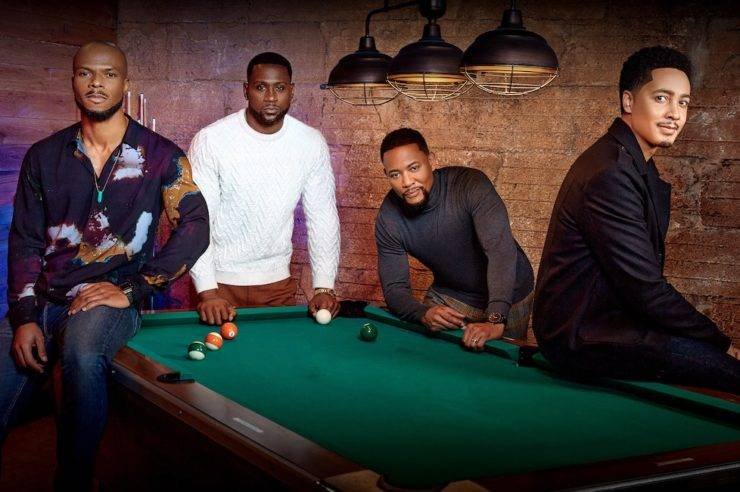From the sci-fi adventures of Lovecraft Country to to the nuanced sisterhood of Insecure, there is a wide range of Black experiences showcased on the screen. But for a long time, the brotherhood shared by Black men and the intricacies of their friendships went untouched. The new Bounce TV drama-comedy, Johnson, fills the long vacant gap, providing a fresh, funny, and relatable new show to the landscape.
The half-hour series, executive produced in part by Cedric The Entertainer, dives into the lives of four childhood friends who share the all-too-common Black last name of Johnson. Now in their 30s in Atlanta, they navigate all the complexities of life together including divorce, micro-aggressions, hair, finances, dating, and what it means to be a man.
Actor Deji LaRay wrote the series and executive produces with his co-star and former NFL running back Thomas Q. Jones. LaRay saw something missing and wanted to see better images of Black men on television.
“It came down to not seeing us on television in the way that I know us,” said LaRay. “Black women have really taken control of their narrative. You have a bunch of great shows that showcase the Black woman experience and the synergy between friends; I didn’t think that there was anything like that for us [Black men] to be proud of.”
Jones began working with LaRay on Johnson in 2017 and saw the show as an opportunity to shatter the negative typecasting of Black men that often align with crime and street politics.
“Coming from the NFL, and knowing all the stereotypes that come with Black men, and even black athletes, it was something that I gravitated towards. It was an opportunity for us to tell our own story and move our own personal narrative forward,” said Jones. “The Black men I know in my life are honest, good people with good intentions to try to take care of families. They’re present and they’re trying to accomplish their goals. They’re trying to navigate through this crazy world that we live in as Black people. So a show like this was an incredible opportunity to be a part of something special.”
LaRay feels Black men are often written about, but not given a voice in popular TV, leading to stereotypes being pushed to the forefront.
“There are a lot of conversations that are going on right now, that we’re a part of, but we’re not a part of. Like, relationship conversations, people, assuming what we think on certain topics, but not really, truly hearing our opinions and our voice. This was a chance for us to really cover a lot of different topics in an organic way, in a fun way, in a way that’s not preachy to where we can express ourselves.”
One of those topics is mental health, long stigmatized in the Black community and a topic Jones says made for an emotional day of filming as he took on his character, Omar.
“There’s a conversation that’s had about mental health and Black men,” said Jones. “The feeling of not having a platform to speak and have our vulnerabilities and our emotions released without backlash of some sort. My character is going through a divorce. And so there’s a child custody battle, and it’s taking a Toulon him.” Episode one of Johnson introduces Omar as a newly separated man struggling through a divorce and custody battle.
“I felt really empowered to bring that piece of the story to life, because there are so many Black men out here that are taking care of their families, taking care of their kids, taking care of their wives and handling business. But you know, a lot of times you see the stereotype that they aren’t. After we shot and we actually saw the episodes when they were edited in sound design and all that, it really hit home at that point. We’re representing a voice that hasn’t been heard.”
There’s nothing like Johnson on TV, and audiences have taken notice. The show debuted as a standout for Bounce, with 2.1 million viewers for the premiere, a record for the network. LaRay attributes the early success to the show’s ability to drive common brunch debates and dinner table conversations forward in the scripted format, and its ability to highlight the woman’s perspective, too.
“I think people are just ready for something different, something new, something honest,” said LaRay.
“It’s not a biased show. The Black women on this show use their voices and come from a grounded place. A lot of these conversations that we’re having are conversations that people are having throughout social media. We’re finally bringing those conversations from the social media comment sections to TV when it comes to Black men and Black women.”



